2019年科普版小学英语六年级下册lesson3说课稿
科普版六年级英语下册lesson3_it_will_be_cold_tomorrow
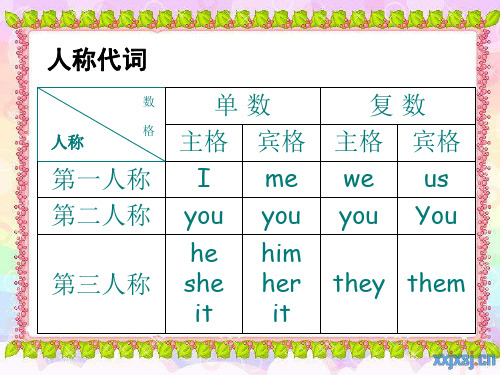
写出单词的相应形式
rain(形容词) rainy snow (形容词) snowy sun (形容词) sunny wind (形容词) windy raining rain(现在分词) won’t will not(缩写) love like(同义词)
/æ / /e/
Say what is the weather like tomorrow? It will be…
Say what is the weather like tomorrow ?
It will be…
Say what is the weather like tomorrow?
It will be…
I like summer . I like swimming .
我喜欢秋天。它是凉爽的。
I like autumn . It’s cool .
我喜欢冬天。我喜欢雪中漫步。
I like winter . It’s fun to walk in snow .
今天是个好天气,不是么?是的
It’s fine, isn’t it? Yes, it is.
sunny
cloudy
rainy
windy
snowy
What’s the weather like tomorrow?
It will be ….
sunny
cloudy
rainy
windy
snowy
Ask and answer: What’s the weather like in…? Beijing England
合拼练习
[æ ]
bat
bag pat tap cap cat dad pack back daddy
科普版英语六年级下 lesson3第一课时

Language points
知识点1 询问及回答某人的周末活动。由what引起的特 殊疑问句。
【教材原文】—What do you usually do on Sundays? —I usually go boating or swimming.
句式结构 —What + do 动词 +人名/人称代词+ do + 时间状语? —人称代词 + often/usually + do + sth .
用法意义 have a good look at意为“好好看看...”。
知识点6 live a good life 的用法
【教材原文】Do the tigers live a good life in the zoo? 用法意义 live a good life意为“过着好的生活”,同义短语 是live a happy life。
Summary
1. 学习了boat, last, zoo, life, protect等单词,以 及have a good look at等短语。
2. 学习了句型。 (1)由what引起的特殊疑问句询问及回答某人的活动。 —What + do 动词 +人名/人称代词+ do + 时间状语? —人称代词 + often/usually + do + sth.
知识点7 do one’s best 的用法
【教材原文】So people are doing their best to protect them. 用法意义 do one’s best意为“尽某人最大可能,竭尽全力”, do one’s best to do意为“尽某人最大可能做某事”。
科普版英语六年级下 lesson3 第三课时

Listen and tick 快速浏览图片,注意观察每幅图片所呈现的信息
✔
✔
✔
✔
听力原文
1. I went to the zoo last Sunday. 2. — Did you read a book last Sunday?
— No, I watched TV. 3. He was born in May, 1998. 4. The elephant is heavier than the giraffe.
One day I was driving my car along the road in Australia. Suddenly the cars in front of me stopped. I got out of my car to have a look.
[maɪn] 我的 There were about ten cars in front of mine. “What are they waiting for?” I thought.
Exercises 一、用所给单词的形式正确形式填空。 1.I was __d_r_i_v_in_g___(drive) my car along the road. 2.I __g_o_t__(get) out of my car to have a look. 3.He __s_a_w__(see) the children crossing the garden. 4. There _w__e_re__(be) about ten cars in front of mine yesterday. 5.I __w_a_l_k_e_d__(walk) up to the tree and found a little dog.
六年级下英语教案-Lesson3Itwillbecoldtomorrow2-科普版

六年级下英语教案Lesson 3 It will be cold tomorrow2科普版教学内容本节课是科普版六年级下册英语Lesson 3,主题为"It will be cold tomorrow",主要围绕天气预报和天气状况进行教学。
课程内容包括天气预报的常用表达、天气状况词汇、一般将来时的运用以及相关阅读材料的理解和分析。
教学目标1. 知识目标:学生能够掌握并运用天气预报的常用表达,如"It will be";学会描述不同天气状况的词汇,如"sunny"、"rainy"、"cloudy"、"windy"等;能够正确运用一般将来时描述未来天气。
2. 技能目标:通过听力练习,提高学生对天气预报信息的理解能力;通过口语练习,提升学生的英语表达能力;通过阅读练习,增强学生的阅读理解能力。
3. 情感目标:培养学生对英语学习的兴趣,增强学生合作学习的意识,激发学生对自然科学的好奇心。
教学难点1. 天气预报的常用表达和天气状况词汇的记忆和应用。
2. 一般将来时的正确运用,特别是在描述未来天气时的语法准确性。
3. 阅读材料中的复杂句子结构和信息的提取。
教具学具准备1. 多媒体教学设备:用于播放天气预报的音频和视频材料。
2. 天气预报卡片:用于学生练习描述天气的教具。
3. 黑板和粉笔:用于板书设计和展示重点知识。
4. 学生课本和练习册:用于学生跟随课程和完成练习。
教学过程1. 导入:通过播放一段天气预报的视频,引起学生对天气主题的兴趣。
2. 新知识学习:介绍天气预报的常用表达和天气状况词汇,通过示例和练习让学生掌握。
3. 语法讲解:详细讲解一般将来时的结构和用法,通过例句和练习让学生学会正确运用。
4. 听力练习:播放不同天气预报的音频,让学生听后描述所听到的天气情况。
5. 口语练习:分组进行角色扮演,模拟天气预报的情景,练习口语表达。
科学普及出版社三年级起点小学六年级英语下册教案Lesson 3 Did you go boating last Sunday_教案4
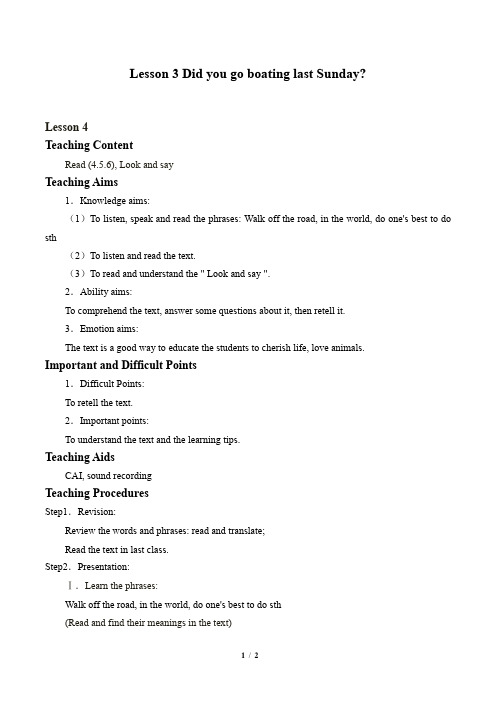
Lesson 3 Did you go boating last Sunday?Lesson 4Teaching ContentRead (4.5.6), Look and sayTeaching Aims1.Knowledge aims:(1)To listen, speak and read the phrases: Walk off the road, in the world, do one's best to do sth(2)To listen and read the text.(3)To read and understand the " Look and say ".2.Ability aims:To comprehend the text, answer some questions about it, then retell it.3.Emotion aims:The text is a good way to educate the students to cherish life, love animals.Important and Difficult Points1.Difficult Points:To retell the text.2.Important points:To understand the text and the learning tips.Teaching AidsCAI, sound recordingTeaching ProceduresStep1.Revision:Review the words and phrases: read and translate;Read the text in last class.Step2.Presentation:Ⅰ.Learn the phrases:Walk off the road, in the world, do one's best to do sth(Read and find their meanings in the text)Ⅱ.Learn the text:1.Listen to the sound recording and perceive the text;2.Listen to the sound recording and understand the pictures;3.Listen, read and translate;4.To underline some difficult sentences and v-ed:get --- got, walk --- walked, start --- startedStep 3.Practice:Ⅰ.Read the text fluently and answer the questions:1.What did the koala do at last?2.Are there many koala in the world?3.How many kinds of animals are talked after the passage?4.What should we do to protect the animals?Ⅱ.(PPT/flip charts) To offer key words, pictures, and sound recording, let the students to read.Ⅲ.According to the information's, let the students to retell the text.Step 4.Look and sayⅠ.Listen to the recording;Ⅱ.Read after the recording and translate.Homework-writing1.Read the text five times or retell it;2.How do our best to protect the rare animals?Blackboard-writing:Lesson 3 (Read)A mother koala and her baby。
六年级下册英语书第三课

六年级下册英语书第三课English:The third lesson in the sixth grade English book covers various topics related to daily routines, such as waking up, having breakfast, going to school, and returning home. It aims to teach students essential vocabulary and phrases to express their daily activities in English. The lesson begins with a warm-up activity where students identify the daily routines of different people depicted in pictures. Then, it progresses to introducing new vocabulary words and phrases through examples and exercises. Students learn how to describe their own daily routines using the present simple tense and adverbs of frequency. They also practice forming questions to inquire about others' daily activities. Throughout the lesson, there are listening exercises to improve students' listening comprehension skills, as well as speaking activities to encourage them to communicate orally in English. By the end of the lesson, students should be able to confidently talk about their daily routines and understand similar conversations from others.中文翻译:六年级英语书的第三课涵盖了与日常生活相关的各种话题,如起床、吃早餐、上学和放学等。
科普版小学英语六年级下册Lesson3 Did you go boating last Sunday优质教案
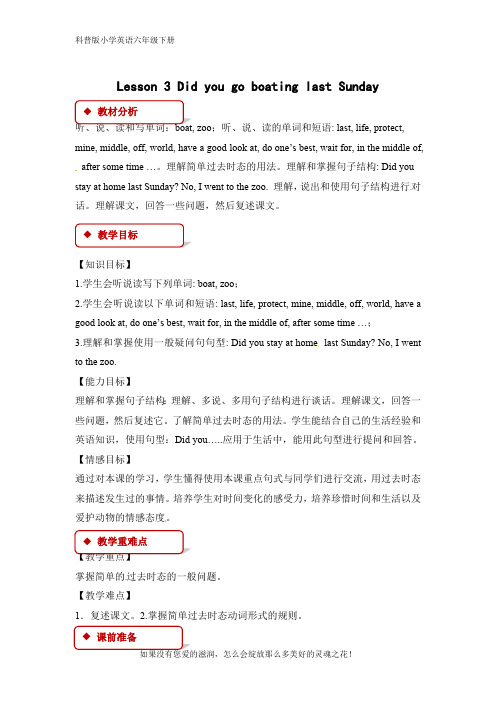
Lesson 3 Did you go boating last Sunday;听、说、读的单词和短语: last, life, protect,mine, middle, off, world, have a good look at, do one’s best, wait for, in the middle of, after some time …。
理解简单过去时态的用法。
理解和掌握句子结构: Did you stay at home last Sunday? No, I went to the zoo. 理解,说出和使用句子结构进行对话。
理解课文,回答一些问题,然后复述课文。
【知识目标】1.学生会听说读写下列单词: boat, zoo ;2.学生会听说读以下单词和短语: last, life, protect, mine, middle, off, world, have a good look at, do one’s best, wait for, in the middle of, after some time …;3.理解和掌握使用一般疑问句句型: Did you stay at home last Sunday? No, I went to the zoo.【能力目标】理解和掌握句子结构:理解、多说、多用句子结构进行谈话。
理解课文,回答一些问题,然后复述它。
了解简单过去时态的用法。
学生能结合自己的生活经验和英语知识,使用句型:Did you…..应用于生活中,能用此句型进行提问和回答。
【情感目标】通过对本课的学习,学生懂得使用本课重点句式与同学们进行交流,用过去时态来描述发生过的事情。
培养学生对时间变化的感受力,培养珍惜时间和生活以及爱护动物的情感态度。
掌握简单的过去时态的一般问题。
【教学难点】1.复述课文。
2.掌握简单过去时态动词形式的规则。
Tape recorder, MultimediaStep 1. Greetings and warm-up activities1. Free talk:--- What did you usually do on Sundays?--- I usually…--- Did you do your homework last Sunday?--- Yes, I did. No. I didn’t.--- Was it difficult?2. Learn the new words and phrases.boat (coat, road), last(fast,), last, life, protect, do one’s best, have a good look at(read, translate)3. Let’s talk.A. Answer the following questions:1. What does Dali us ually do on Sundays?2. Did Dali go boating last Sunday?3. Where did Dali go last Sunday?4. How did they see the tigers?5. Do the people protect the tigers?B. Listen to the sound recording and answer the questions.C. Read the dialogue after the recording.Step 2 Let’s learn.Did you stay at home last Sunday? No, I went to the zoo. 过去式:did went showed liked1. 选择一些学生背诵或表演对话。
六年级下册英语说课稿-Unit 3 We should learn to take care of

六年级下册英语说课稿-Unit 3 We should learn to take care of ourselves 第二课时湘少版(三起)一、教材分析本课是《湘少版英语》六年级下册Unit 3的第二课时,主要介绍了如何保护眼睛的相关知识和技能。
本课程结合了听、说、读、写四种能力的培养,在教学内容设计上,同时注重语言技能的应用和知识点的拓展。
教师在教学前应准备好教材配套的教具和图片,并根据教材要求编写教学PPT。
二、教学目标1. 知识目标1.熟练掌握单词和短语:eyesight, protect, glasses, contact lenses, Take care of yourself;2.理解并能够正确使用下列句子:–We should protect our eyesight.–We can wear glasses to help us see better.–Some people wear contact lenses instead of glasses.–We should learn to take care of ourselves.2. 能力目标1.培养学生阅读、理解和表达英语的能力;2.培养学生听、说、读、写英语的能力;3.提高学生的英语实际运用能力。
3. 情感目标通过本课教学,培养学生的自我保护意识,告诫他们要珍惜自己的健康,自觉学会保护自己的眼睛,增强他们的自信和自尊心。
三、教学步骤1. 导入新知识1.教师通过演示一个物品,然后要求同学根据蒙眼猜测物品是什么的方式,引导学生理解眼睛的重要性;2.教师播放相关视频,介绍如何保护眼睛,引导学生认识到眼睛需要受到保护。
2. 学习新知识1.教师播放课文录音,并先让学生理解文章大意;2.教师梳理文章字词、短语的意思,让孩子掌握文章的重点及其要点;3.教师讲解句型,让孩子了解句子的构成方法及其用途。
3. 操练新知识1.小组讨论:要求学生根据所学内容用英语表述如何保护眼睛;2.教师引导学生互相交流,纠正语言误区,提高交流水平。
六年级科普版英语3-6课教学案

纸店镇一中六年级英语学科科普版教学案
会盟镇雷河小学六年级英语学科科普版教学案
会盟镇雷河小学六年级英语学科科普版教学案
会盟镇雷河小学六年级英语学科科普版教学案
会盟镇雷河小学六年级英语学科科普版教学案
会盟镇雷河小学六年级英语学科科普版教学案
会盟镇雷河小学六年级英语学科科普版教学案
会盟镇雷河小学六年级英语学科科普版教学案
会盟镇雷河小学六年级英语学科科普版教学案
会盟镇雷河小学六年级英语学科科普版教学案
会盟镇雷河小学六年级英语学科科普版教学案
.。
小学英语科普版六年级下册Lesson 3 Did you go boating last Sunday教案模板范文

小学英语科普版六年级下册Lesson 3 Did you go boatinglast Sunday教案模板范文1重点难点教学重点:熟练掌握过去式不规则变化的动词并准确使用句型:Did you do …? I did …教学难点:将过去式不规则变化的动词替换到真实语境当中教学措施:为了达到教学目标,利用多媒体一些特有的功能和优势,采用灵活多样的教学方法,通过创设情境,设计任务,穿插游戏等活动,突出重点,突破难点,在课堂上落实六年级学生听、说、读、三项技能的训练。
真正做到“学中用,用中学”,体现英语教学的交际性。
2教学过程2.1第一学时教学活动1【导入】Lead in1.唱英语歌曲“Bingo”2.欣赏音乐“Yesterday once more”边听音乐边看一些老照片。
2【讲授】Presentation1.学习不规则动词的过去式1.T:There are some trains. Each train has a verb in it. Do you know their past tense?T:The first train ride, its past tense is rode. The second train is write, its past tense is wrote. These two words should change “I” to “o”.T:The third train is buy, its past tense is bought. We should erase uy and plus ought.T:The last train is draw, its past tense is drew. We should change aw to ew. T:go-went read-read/red take-took2.进一步强化动词的过去式T:There are some lucky eggs. You can pick an egg. Each egg has different scores. If you can answer it you can get the score.(小组竞赛:学生代表小组进行选择回答,将动词的原形与过去式进行匹配,回答正确可以获得鸡蛋上的分数)T:Can you find some secret?(出示动词不规则变化的顺口溜)。
六年级下英语教案-Lesson3Itwillbecoldtomorrow-科普版

六年级下英语教案 Lesson 3 It will be cold tomorrow 科普版教学内容本课为科普版六年级下册英语第三课,主题为“明天将会很冷”。
教学内容主要围绕天气的描述,学习将来时态以及与天气相关的词汇和表达方式。
课程通过听、说、读、写的多元化教学活动,使学生能够在实际情景中准确运用英语描述未来天气,并培养他们的语言运用能力。
教学目标1. 知识目标:学生能够掌握描述天气的将来时态结构,如 "Itwill be cold tomorrow." 并能够运用相关词汇,如 "sunny", "rainy", "windy" 等。
2. 能力目标:学生能够在对话中正确运用将来时态描述未来天气,并能在真实生活场景中进行天气预报的模拟练习。
3. 情感目标:通过学习天气话题,激发学生对自然科学现象的兴趣,培养他们的环保意识和观察力。
教学难点1. 将来时态的使用:学生需要理解并掌握将来时态的结构和用法,特别是 "will" 的正确运用。
2. 天气词汇的记忆:学生需要记住并能够正确拼写各种天气状况的英语表达。
3. 对话中的自然表达:学生需要学会在实际对话中自然流畅地使用所学表达方式。
教具学具准备1. 多媒体教学设备:用于播放天气预报视频和展示PPT教材。
2. 天气卡片:用于词汇学习和练习。
3. 学生手册和练习本:用于课堂练习和记录。
4. 黑板和粉笔:用于板书设计和实时展示。
教学过程第一阶段:导入利用多媒体展示不同天气的图片,引导学生复习已知的天气词汇。
提问学生:“Can you tell me what the weather is like today?” 引导他们用现在时态描述当前天气。
第二阶段:新课内容介绍通过天气预报视频,引入将来时态的概念。
讲解 "It will be cold tomorrow." 句型的结构和用法。
科普版-英语-六下-Lesson 3 第二课时 教案
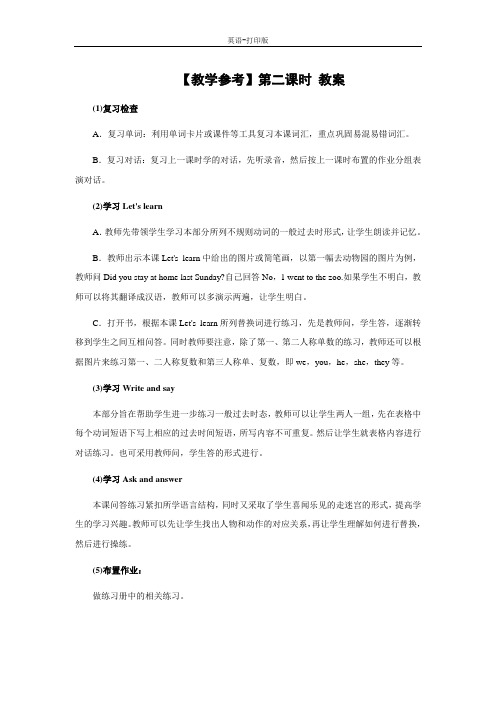
英语-打印版
【教学参考】第二课时教案
(1)复习检查
A.复习单词:利用单词卡片或课件等工具复习本课词汇,重点巩固易混易错词汇。
B.复习对话:复习上一课时学的对话,先听录音,然后按上一课时布置的作业分组表演对话。
(2)学习Let's learn
A.教师先带领学生学习本部分所列不规则动词的一般过去时形式,让学生朗读并记忆。
B.教师出示本课Let's learn中给出的图片或简笔画,以第一幅去动物园的图片为例,教师问Did you stay at home last Sunday?自己回答No,1 went to the zoo.如果学生不明白,教师可以将其翻译成汉语,教师可以多演示两遍,让学生明白。
C.打开书,根据本课Let's learn所列替换词进行练习,先是教师问,学生答,逐渐转移到学生之间互相问答。
同时教师要注意,除了第一、第二人称单数的练习,教师还可以根据图片来练习第一、二人称复数和第三人称单、复数,即we,you,he,she,they等。
(3)学习Write and say
本部分旨在帮助学生进一步练习一般过去时态,教师可以让学生两人一组,先在表格中每个动词短语下写上相应的过去时间短语,所写内容不可重复。
然后让学生就表格内容进行对话练习。
也可采用教师问,学生答的形式进行。
(4)学习Ask and answer
本课问答练习紧扣所学语言结构,同时又采取了学生喜闻乐见的走迷宫的形式,提高学生的学习兴趣。
教师可以先让学生找出人物和动作的对应关系,再让学生理解如何进行替换,然后进行操练。
(5)布置作业:
做练习册中的相关练习。
2019-2020年六年级英语下册 lesson3教案 科普版
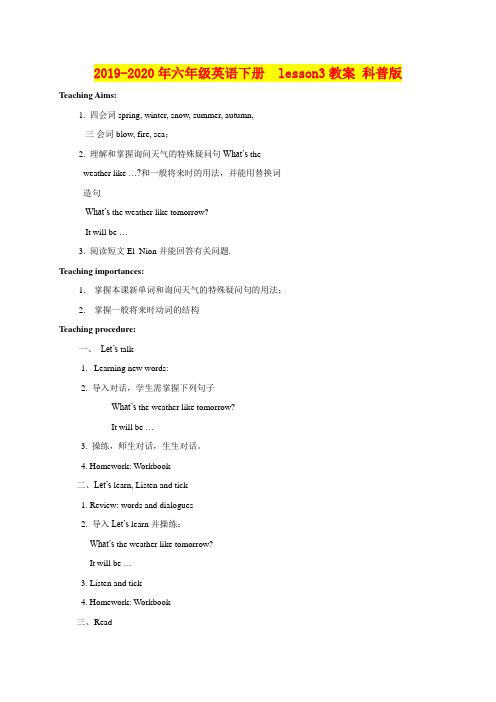
2019-2020年六年级英语下册 lesson3教案科普版Teaching Aims:1. 四会词 spring, winter, snow, summer, autumn,三会词 blow, fire, sea;2. 理解和掌握询问天气的特殊疑问句What’s theweather like …?和一般将来时的用法,并能用替换词造句What’s the weather like tomorrow?It will be …3. 阅读短文 El Nion 并能回答有关问题.Teaching importances:1. 掌握本课新单词和询问天气的特殊疑问句的用法;2. 掌握一般将来时动词的结构Teaching procedure:一、Let’s talk1. Learning new words:2. 导入对话,学生需掌握下列句子What’s the weather like tomorrow?It will be …3. 操练,师生对话,生生对话。
4. Homework: Workbook二、Let’s learn, Listen and tick1. Review: words and dialogues2. 导入Let’s learn并操练:What’s the weather like tomorrow?It will be …3. Listen and tick4. Homework: Workbook三、Read1. Review2. 导入新课A. Learning phrase:come around, bring aboutB. 用听音法导入ReadC. 操练D. Answer some questions:1. What will El Nion bring to us?2. What does El Nion mean in Spanish?3. What will happen when El Nion comes?4. What place did droughts hit in 1982?5. What place did big floods hit in 1998?6. Is EL Nion always bad?7. Homework: Workbook附送:2019-2020年六年级英语下册 lesson4(1)教案科普版一、教学目标:1. 掌握字母组合-er-的拼读规则。
科普版英语六年级下册Lesson 3第三课时 课件

I walked up to the first car. What did I see? I saw a mother koala with a baby on her back. She wanted to cross the road, but she just sat down in the middle of the road. [ˈmɪdl] 中间的;中部的
我走向第一辆车。我看到了什么?我看到一只母考拉背着一 个小考拉。她想过马路,但她只是在马路中间坐了下来。
with sth. on one’s back 背上背着 sit down 坐下 in the middle of在......中间
Read again and answer these questions.
There were about ten cars in front of mine. “What are they waiting for?” I thought.
我前面大约有十辆车。“他们在等什么?”我想。
I walked up to the first car. What did I see? I saw a mother koala with a baby on her back. She wanted to cross the road, but she just sat down in the middle of the road.
— No, I watched TV.
Homework
one
科普版小学英语六年级下册Lesson 3 It will be cold tomorrow.教学设计
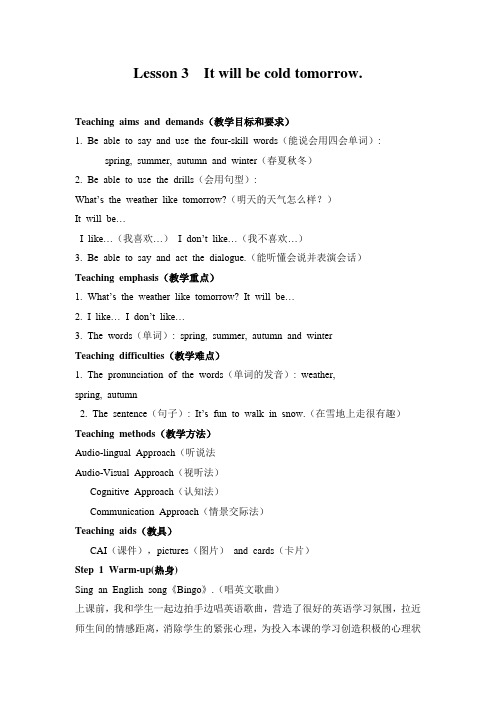
Lesson 3 It will be cold tomorrow.Teaching aims and demands(教学目标和要求)1. Be able to say and use the four-skill words(能说会用四会单词):spring, summer, autumn and winter(春夏秋冬)2. Be able to use the drills(会用句型):What’s the weather like tomorrow?(明天的天气怎么样?)It will be…I like…(我喜欢…)I don’t like…(我不喜欢…)3. Be able to say and act the dialogue.(能听懂会说并表演会话)Teaching emphasis(教学重点)1. What’s the weather like tomorrow? It will be…2. I like… I don’t like…3. The words(单词): spring, summer, autumn and winterTeaching difficulties(教学难点)1. The pronunciation of the words(单词的发音): weather,spring, autumn2. The sentence(句子): It’s fun to walk in snow.(在雪地上走很有趣)Teaching methods(教学方法)Audio-lingual Approach(听说法Audio-Visual Approach(视听法)Cognitive Approach(认知法)Communication Approach(情景交际法)Teaching aids(教具)CAI(课件),pictures(图片)and cards(卡片)Step 1 Warm-up(热身)Sing an English song《Bingo》.(唱英文歌曲)上课前,我和学生一起边拍手边唱英语歌曲,营造了很好的英语学习氛围,拉近师生间的情感距离,消除学生的紧张心理,为投入本课的学习创造积极的心理状态。
科普版六年级下册英语第三课第一课时Let's talk
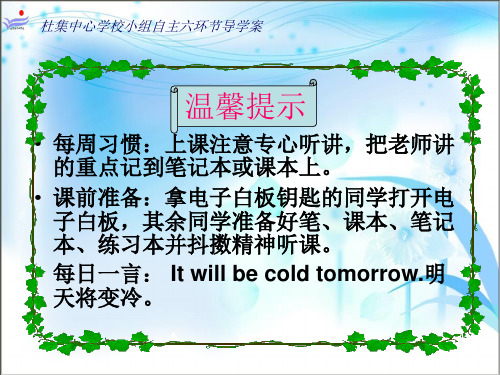
注意一、反义疑问句是疑问句的一种,它对陈述部分的事 实提出相反的疑问,形式上是一个省略问句,附加在陈述 句后,即: 陈述句 + 逗号 + 省略问句 + 问号 It’s fine , isn’t it ? You are from America, aren’t you? 注意二、遵循前否定后肯定或前肯定后否定的原则
• at all 是一个固定短语,意为:“根本,丝毫, 完全”,起加强语气的作用,常用于否定句 中,表示“根本不,一点儿也不”的意思。 即:not at all根本不,一点也不。
• I like summer. 我喜欢夏天。I love swimming. 我喜爱游泳。
• love在此处是动词,表示“爱好;喜欢”,相 当于like,但比like更富有感情色彩,表示强 烈的“爱”的情感。
• 今天天气很好。
• It is fine.
杜集中心学校小组自主六环节导学案
轻松演练
• I ____ like winter at all.
• A. don’t B. not
C. doesn’t
• 2.What’s the weather ___ today.
• A. like
B. with
C. for
• 我一点也不喜欢夏天。• I don’t like summer at
夏天太热了。
all. It’s too hot.
• 东东喜欢秋天。秋天 • Dongdong likes
凉爽。
autumn. It is cool.
• 今天的天气怎么样? • What’s the weather like today?
六年级下册英语说课稿-Unit 6 Summer Vacation Lesson 3∣人教新起点

六年级下册英语说课稿-Unit 6 Summer Vacation Lesson 3∣人教新起点一、教材分析《人教新起点英语》六年级下册Unit 6 Summer Vacation Lesson 3,是一篇关于暑假旅游的故事,主要讲述了小明和他的家人在暑假期间去旅游的经历。
通过阅读,学生可以了解如何在旅游中彼此帮助、分享和尊重他人。
本单元的重点词汇包括:experience, trip, guide, national park, waterfall, rock climbing, zip-lining。
本课时的语法焦点为一般过去时态的使用及活用。
二、教学目标1.学生能够听懂、理解并运用本课时中的关键词汇。
2.学生能够运用一般过去时态描述暑假旅游经历。
3.学生能够运用一般过去时态掌握动词的变化规律。
三、教学重点难点1.教学重点:运用一般过去时态描述暑假旅游经历。
2.教学难点:掌握动词在一般过去时态中的变化规律。
四、教学流程1. 情境呈现通过对学生进行情境讲述,引入本课时的主题——暑假旅游,让学生体验、感受并预测故事中的情节。
2. 学生阅读课文让学生在安静的环境下阅读课文,针对文中重点词汇和重要句型进行讲解和讨论。
帮助学生涵盖理解全文,感受文中情感,掌握重点知识。
3. 交互学习学生分组进行阅读,相互交流,并小组展示交流结果。
鼓励学生在交流的过程中使用英语进行交流,相互学习,相互帮助。
教师及时纠正学生的语言错误,帮助学生明确自己的表达。
4. 语法掌握在学生理解故事内容的基础上,针对本课时的重点语法一般过去时态进行具体讲解。
教师帮助学生理解和掌握谓语动词的变化规律,加强学生在运用一般过去时态时的准确性。
5. 口语表达通过任务型活动的形式,让学生结合课文内容,分组进行口语表达。
目的是让学生在语言环境中感受语言,锻炼语感,学习语言表达。
教师依据学生的水平适时介入,给予更合适的语言支持。
6. 作业布置布置相关作业,巩固和拓展学生在本课时的掌握的知识点。
(小学教育)2019年六年级英语下册 Lesson3 Is Steven There教案 冀教版
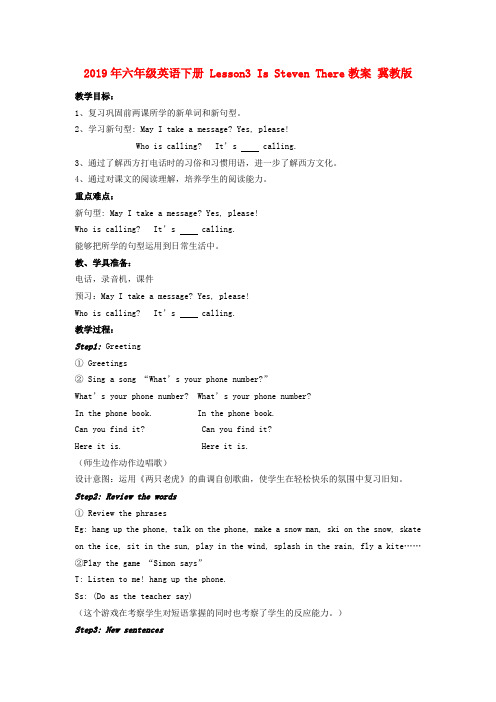
2019年六年级英语下册 Lesson3 Is Steven There教案冀教版教学目标:1、复习巩固前两课所学的新单词和新句型。
2、学习新句型: May I take a message? Yes, please!Who is calling? It’s calling.3、通过了解西方打电话时的习俗和习惯用语,进一步了解西方文化。
4、通过对课文的阅读理解,培养学生的阅读能力。
重点难点:新句型: May I take a message? Yes, please!Who is calling? It’s calling.能够把所学的句型运用到日常生活中。
教、学具准备:电话,录音机,课件预习:May I take a message? Yes, please!Who is calling? It’s calling.教学过程:Step1: Greeting① Greetings② Sing a song “What’s your phone number?”What’s your phone number? What’s your phone number?In the phone book. In the phone book.Can you find it? Can you find it?Here it is. Here it is.(师生边作动作边唱歌)设计意图:运用《两只老虎》的曲调自创歌曲,使学生在轻松快乐的氛围中复习旧知。
Step2: Review the words① Review the phrasesEg: hang up the phone, talk on the phone, make a snow man, ski on the snow, skate on the ice, sit in the sun, play in the wind, splash in the rain, fly a kite……②Play the game “Simon says”T: Listen to me! hang up the phone.Ss: (Do as the teacher say)(这个游戏在考察学生对短语掌握的同时也考察了学生的反应能力。
- 1、下载文档前请自行甄别文档内容的完整性,平台不提供额外的编辑、内容补充、找答案等附加服务。
- 2、"仅部分预览"的文档,不可在线预览部分如存在完整性等问题,可反馈申请退款(可完整预览的文档不适用该条件!)。
- 3、如文档侵犯您的权益,请联系客服反馈,我们会尽快为您处理(人工客服工作时间:9:00-18:30)。
2019年科普版小学英语六年级下册lesson3说课稿Lesson 3 . It will be cold tomorrow.Teaching contents:let’s learn and let’s talkTeaching aims:Read, understanding of let 's learn topic sentences and can replace training. Understanding of let 's talk, and proficient in reading aloud.Teaching important:Understanding of let 's talk, and proficient in reading aloud.Teaching method:After learning to teach Practice in class.Teaching aids: Point reading machineTeaching process:一、Review: I can answer!二、Show the learning aims .Read, understanding of let 's learn topic sentences and can replace training.Understanding of let 's talk, and proficient in reading aloud.1.准确朗读、正确理解let’s learn主题句型并能用替换词进行替换训练。
2.了解let’s talk的谈话内容,并能熟练朗读。
三、Let’s learn1. Show the self-study guidance:出示自学Let’s learn指导:⑴.正确朗读并能理解本课主题句型:What’s the weather like tomorrow ?It will be ____.⑵.能用所提供的替换词进行替换训练。
windy rainy hot cold2. Check the learning effect检查自学效果:读——译——替换进行对话练习四、Let’s t alk:1. Show the self-study guidance:出示自学指导:⑴正确熟练朗读并能翻译Dongdong 和Lulu的聊天内容,不会的地方可以请教小组内的同学或老师。
⑵.能根据let’s talk的内容完成相关的训练题。
2. Check the learning effect检查自学效果:⑴.仿照聊天实况,引导学生进行逐句读——译。
⑵.听录音完成表格。
⑶.根据表格内容完成下列片段。
五、小知识、大学问Small knowledge, the University asked六、Homework:收听今晚的天气预报,并做记录。
(不少于30个单词)板书设计:Lesson 3 . It will be cold tomorrow.What’s the weather like tomorrow ?It will be cold.附送:2019年科普版英语三到六年级词语句子归纳三年级上册词汇:Pig 猪 fox 狐狸 am 是 cat 猫 dog 狗 good morning 早上好 are 是 you 你 a 一个 Boy 男孩 yes 是的 girl 女孩meet too my is goo dbye your please sit down what new me how old sorry not know ten bear duck this letter thank bird it that fish frog hen monkey look room bag in cap hat colour blue and red can ball black white fine mum dad glad banan a for an apple baby chick pear find sad big fat yellow quick miss Mrs hi hello I no nice name bye excuse nine bee he she see 三年级上册涉及句型:1、Greetings. Hi ! Hello ! Good morning . Nice to meet you . How are you ? How do you do ?2、Personal in for mation及What、How引导的特殊疑问句:What’s your name ? 、How old are you ? 、What’s this /that? 、What colour is it ?3、一般疑问句:Is this …三年级下册词汇:again me bad at English help dress but short then let us make blouse nice vest like on ship so many animal no elephant there where my doll bed box with fine day fun the sun play game run race line up two hungry hut little open door who grandma wait we him table plate of cake has bun chips hot she brother sis ter he name three kite fly bike cool ride why toy white cold go home still nose close thanks Coke birthday her thing get happy count candle four five six seven eight nine sing great Mr Mrs三年级下册涉及句型:1、Back to sp.2、It’s too +adj. …3、Where引导的特殊疑问句:Where is …?4、Let引导的祈使句:Let’s …5、Who引导的特殊疑问句:Who is …?6、Doing引导句型:Visiting sb. …四年级上册词汇:little friend swim bend hill what desk cup guess clock sorry one look book good pencil box pen panda family mother sister brother happy read please see green tree many three sheep meet morning ball hurt doctor horse cook bird worker nur se tall school who teacher are pupil ask class four two sleep room time eight all right seven late again Sunday today play day find where near here car there un der chair dear cow say to her may town now know old joke our how your bus English jeep plane boy girl you work want plant wheat myself cut too cold bread eat四年级上册涉及句型:1、I can …2、What 引导的特殊疑问句:What can you see ? 、What’s on the desk ? 、What’s the time ?、 What’s this in English ?3、Let 引导的祈使句:Let’s say hello to sb. …、 Let’s play school .4、关于第一人称、第二人称的一般疑问句:Are you a doctor ? 、Is this your sth. …?四年级下册词汇:new classroom grade way glasses they table behind from America about teacher s chool hospital son daughter their eleven only family beautiful think dance fish Tib et climb together there those tiger shop buy them egg twelve thirteen fifteen eig hteen twenty farm any farmer has every well today back f ast watch whose his v ery much mother weather photo for building sport ground flower friend Chinese st udy busy clothes colour blue sock yellow shoe brown nut apple skirt banana ora nge coat free shopping Monday stay call idea father walk parrot market talk miss ed seat be tomorrow park spit grass little asleep touch after fall down cry hungr y something rat over lunch rabbit small away goat deer catch 四年级下册涉及句型:1、一般疑问句:Are you in Grade …? Are you from sp. ? Are these…(animals)?2、Go to your seat , please.3、Where 、What 、Whose、How引导的特殊疑问句:Where are you from ? 、What are there ?、What colour is … ? 、Whose sth. is/are …? 、How many …can you see?4、Let 引导的祈使句:Let’s …五年级上册词汇:ruler short long use certainly show outside inside puter keyboard mouse tall mouth hand write letter E-mail clever draw just or mom matter either playground football Sunday centre often ping-pang horse basketball player grandpa pool water wash cook clean homework slow supper slowly house sleep out carrot face food better stamp collect chess sometimes when week listen music cartoon own drink would bottle milk ice-cream waiter restaurant man chicken sir friend moment fat f orget left right potato tomato could else cinema ticket half film eye anything mea t pound money remember paper until thief knock door open into really believe w ill police share river五年级上册涉及句型:1、一般疑问句:Do you have …?Are you washing clothes ? Do you like …?2、What、 How many 引导的特殊疑问句:What are you doing ? 、What would you like ?How many sth. do you want ?3、虚拟疑问句:Could I have some sth. ?4、A puter has a keyboard.5、I like doing sth. ..五年级下册词汇:speak message question tell number pizza learn roll pull spread bake job must str eet light cross wait silly hit tours mine theirs ours its breakfast carry front mount ain forest village child sick send other zoo end London office station next turn pl ace Friday same woman ready spaceship off space star valley shine land sand thir ty forty fiftydoctor marry was husband twice American people throw around can useful pick put bin different wife hard hour lesson o’clock Tuesday Thursday Saturd ay party invitation telephone present plane evening afternoon interesting policeman manager choose cleaner kind ring answer which machine wonderful fridge wall thin picture someone chat net each mobile sky Wednesday Mars五年级下册涉及句型:1、表虚拟的一般疑问句:May I speak to…?2、一般疑问句:Is this …yours ? Is there sp. …+ 表方位名词?3、I can see + number + n..-s .4、How、What 引导的特殊疑问句:How many …is/are there ? What day is today ?5、There is … It is + time .6、有实义动词的否定句:We mustn’t cross the street .六年级上册词汇:always usually rice early sunlight wake exercise kitchen anyone wrong before afraid suddenly begin bark bite Washington typist age type pay dollar month start weekday year factory by far Pa ris travel train worried safe last agree window ant rise east world high higher th an cloud hide bright traveler earth night never stop tired pea beef soup pass se ntence word another young hair aunt pretty ugly laugh hotel cheap happily guard leave hear quickly jump onto worry came heavy giraffe strong lift stone even reac h leaf easily meal merry Christmas mask Halloween lantern dress ghost candy driv e bridge through apartment elevator eighteenth more bedroom south metre tallest China west famous Asia city visit六年级上册涉及句型:1、第一人称、第三人称一般疑问句:Do you always do sth at + time .Does she/he always do sth ?2、Where 、When 、How 引导的特殊疑问句:Where do you live ?When do you usually get up ?How do you go to school ?3、Which + 比较级?Which sth is +形容词比较级?4、Give me some …, please .5、选择疑问句:Is she tall or short ?6、涉及比较级陈述句:The giraffe is taller than the deer .7、Greetings Merry Christmas !六年级下册词汇:runner、middle、shirt、T-shirt 、first、ear、if、farther、shout、reading room 、third floor fifth、second、along、road、donkey、spring、winter、snow 、summer 、autumn、 blow、 El Nino、 bring fire 、rain、drought 、sea、bee、warm、change、wind、Australia、dry、lake、full、grow、build、parents、 teach、student、driver、large、singer、song、date 、March 、join 、important、 air、 without、 life、 keep、 flow、 sand、wich、 protect 、country、 Toronto、 Canada、 holiday、 trip、 capital、France、 Rome、 Italy、 Russia、 seaside、 Sydney、 term、 June、 yesterday、were 、did、 had、 meeting、 April、fool、 succeed、trick、test 、told 、news 、review 、came 、surprise 、sure 、himself 、born 、September 、because 、few 、ago、 bought、 February 、May、 once king garden s aid flew try hop went northeast clearly rare wild got wonder saw koala across sa t Australian took dully dull umbrella began ran wet centimetre die dinosaur flood whale between thousand hamburger Africa made wide ate boat Norway Chic ago soldier六年级下册涉及句型:1、Who does+ 最高级 +介词短语?2、It’s on the + ordinal numbers +floor .3、表陈述的简单未来式 It will be …4、What引导的简单未来时及有时间限定的句式 What will you do….? What will you do when …5、一般过去式的一般疑问句 Was it Children’s Day yesterday ? Did you do …(+ 表过去时间段) ?6、一般过去式的特殊疑问句 What did you do +表过去时间段的短语? When were you born ?小学教育资料好好学习,天天向上!。
